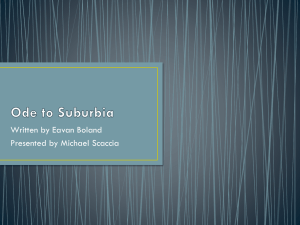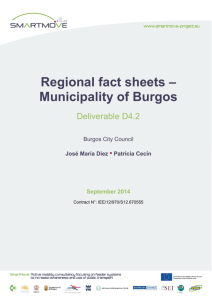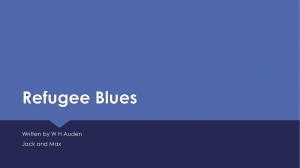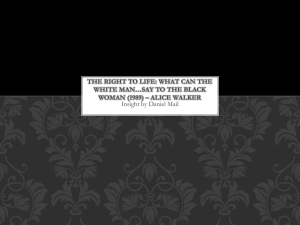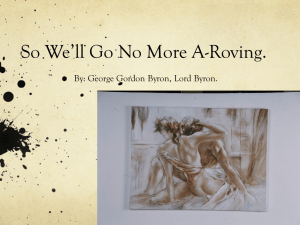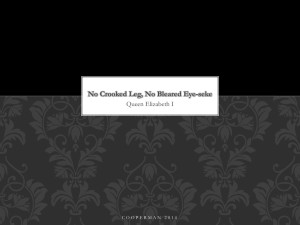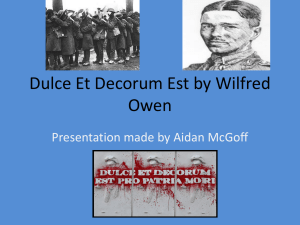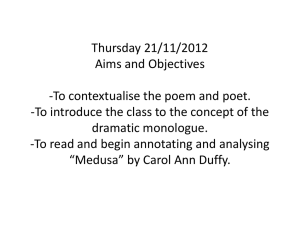File - BaserEnglishProgram
advertisement
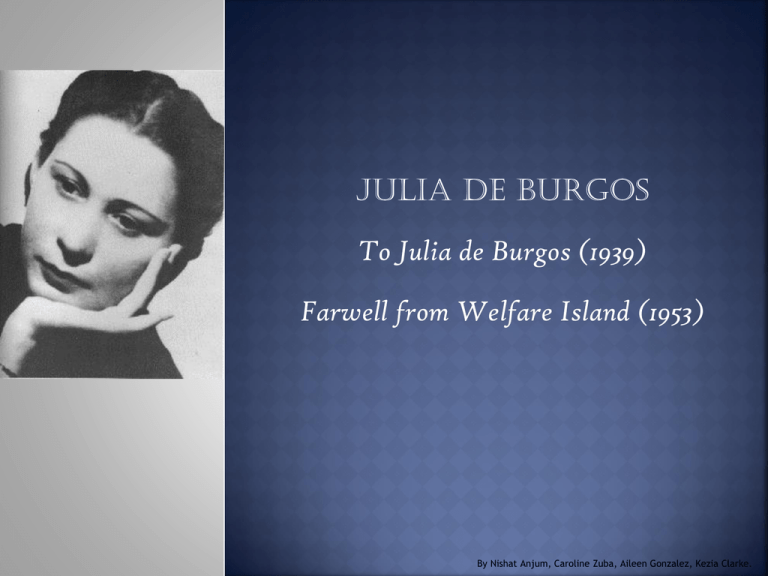
Julia de Burgos To Julia de Burgos (1939) Farwell from Welfare Island (1953) By Nishat Anjum, Caroline Zuba, Aileen Gonzalez, Kezia Clarke. On July 5, 1953, two New York City police officers spotted a woman lying unconscious on the street. They rushed her to Harlem Hospital, but she died shortly after a midnight of pneumonia. This woman had no bag nor any identification on her. No one came to claim her body and no missing person's report fit her description. However, a month later, the woman was identified as award winning Puerto Rican, Julia de Burgos. Julia de Burgos was born into a poor family in rural Puerto Rico on February 17, 1914. Burgos was an incredibly intelligent girl. She received schooling by using the money collected among her neighbors who where equally as poor. She earned a teaching degree and became a teacher. She had a deep concern for the exploited workers and for the women subjected to "men being superior" cultural patterns. Her experiences as a teacher and her family background added to her concerns. Burgos had an interest in politics, especially in independence-seeking revolutionary movements. Julia de Burgos is known for writing strongly feminist poems. These poems present a philosophical consideration of the role of women in Puerto Rican society. Burgos was involved with the Puerto Rican Nationalist Party, which promoted the independence of Puerto Rico. This added to her poems. When Julia de Burgos was alive, racial discrimination was rampant. Burgos was of black decent which is why she fought such restrictions. Upon arriving New York City in 1940, racism was one of her major problems. She stayed in New York for a short time, but moved to Cuba for a couple years. She then returned to New York City. Here she was struggling to earn a living as a writer because of racial, ethnic and linguistic discrimination. "She fought back, however, by writing against such oppression. Her alcoholism led to her early death." Burgos was very committed to fighting social injustice. "Burgos stands out as a early feminist activist at a time when Puerto Rican culture restricted women to the traditional roles of spouse and mother." Julia de Burgos wrote during a time of reform. While she was still living in Puerto Rico, Burgos was heavily involved with the Puerto Rican Nationalist Party, a party which promoted the independence of Puerto Rico. This political experience brings about a sense of patriotism in some of her poems. She also write against fascism during Spain’s civil war. She loved the idea of a pure countryside. During this time, racial discrimination was still rampant. Burgos fought against racial discrimination, especially in New York City, were she was obliged to take menial jobs. Puerto Rican culture at this time restricted women to the, at the time, roles of spouse and mother, dubbed traditional roles. She included the belief of feminism in her poems, especially so in her poem “To Julia de Burgos”, where she spoke about how a woman against it was tied to said traditional roles, while Burgos could run free as she was not held down by those roles. She linked all this to political activism, showed in the last verse of the poem, a verse that speaks of a rebellion in which she would join in favor of feministic views. “Farewell from Welfare Island” also shows rebellious views of her time period. She divorced multiple times and never really settled down, which is indicative of her feminist side and her dislike of traditional family roles. To Julia de Burgos. Farewell from Welfare Island. Personal Poems. You are a housewife, resigned, submissive, Already the people murmur that I am your enemy because they say that in verse I give the world your me. tied to the prejudices of men; not me; unbridled, I am a runaway Rocinante snorting horizons of God's justice. They lie, Julia de Burgos. They lie, Julia de Burgos. Who rises in my verses is not your voice. It is my voice You in yourself have no say; everyone governs you; because you are the dressing and the essence is me; your husband, your parents, your family, and the most profound abyss is spread between us. the priest, the dressmaker, the theatre, the dance hall, the auto, the fine furnishings, the feast, champagne, You are the cold doll of social lies, heaven and hell, and the social, "what will they say." and me, the virile starburst of the human truth. You, honey of courtesan hypocrisies; not me; in all my poems I undress my heart. You are like your world, selfish; not me who gambles everything betting on what I am. You are only the ponderous lady very lady; not me; I am life, strength, woman. You belong to your husband, your master; not me; I belong to nobody, or all, because to all, to all I give myself in my clean feeling and in my thought. You curl your hair and paint yourself; not me; the wind curls my hair, the sun paints me. Not in me, in me only my heart governs, only my thought; who governs in me is me. You, flower of aristocracy; and me, flower of the people. You in you have everything and you owe it to everyone, while me, my nothing I owe to nobody. You nailed to the static ancestral dividend, and me, a one in the numerical social divider, we are the duel to death who fatally approaches. When the multitudes run rioting leaving behind ashes of burned injustices, and with the torch of the seven virtues, the multitudes run after the seven sins, against you and against everything unjust and inhuman, I will be in their midst with the torch in my hand. While reading the poem, already one might notice the strange sense of meter in this translation of To Julia de Burgos. From line to line, the series of stressed and unstressed syllables rises and falls unsystematically, however mostly following iambic and trochaic meters. The rhyme scheme is equally unstable, given that she did not restrict herself to one method by which to go about writing. In the eleventh stanza, there is both internal and identical rhyme, in: “You, flower of aristocracy; and me, flower of the people.” Identical rhyme can be spotted once or twice more throughout the poem, but within small word repetitions, such as “me.” Despite the wavering consistency of meter throughout the piece, Julia has created something of a euphony with her words. The rhythm is fluid, especially due to Julia’s elegant choice of words. The imagery, as well is nothing short of pleasing. Her metaphors make her accusations seem much less hostile than they are, such as the likes of: “You, honey of courtesan hypocrisies; not me;” Even though the poem dwell son Julia berating herself for succumbing to social norms, the way in which she wrote this was most well-executed. One would think that for such a poem, given the subject, may have had come across as stern, or something to such regards. As such, de Burgos can be commended for weaving resonance into To Julia de Burgos. That is, bestowing a relatable and realistic view into her piece, without taking away from the vintage elegance of poetry as a whole. It is a highly dramatic poem, representing what is and what should be. The whole poem is actually an optation, meaning it is directed towards another person. In this case, the two people in the poem are Burgos’ poetic self against her social self. The poem presents the themes of freedom and feminism. The tone of the poem is scornful. Special language in the poem consists of the simile, hyperbole, personification and metaphors. Simile is used in the line “You are the cold doll,” as Burgos is comparing the other woman to a doll. Hyperbole is used in the line “in all my poems I undress my heart.” Personification was used in the line “the sun paints me.” This is personification because the sun is said to be doing an action that it physically cannot do in real life. Metaphors include the lines, “honey of courtesan hypocrisies” and “that I am a runaway Rocinante. The poet uses these to create comparisons between herself and the other side of her. In the poem to Julia de Burgos, she explores her internal struggles as Julia de Burgos "the poet" and Julia de Burgos "the social woman" are being compared. She writes how as a women she is expected to meet all of society's expectations and conform to the social norms and be the "flower of the aristocracy“, while as a poet she is free to express all that she wants and is the "flower of the people" breaking away from the injustice. In "You are the cold doll of social lies, and me, the virile starburst of the human truth," she states that as a woman she is nothing but a meaningless object in which the social norms’ lies are projected upon: weakness, inferiority to men, submissiveness while as a poet, she is the truth; only then can she show who she really is: rebellious, strong, and her own person. Throughout the poem she uses metaphors to further contrast her two personalities. "I am a runaway Rocinante snorting horizons of God's justice;" here she compares herself to a faithful but worn-out horse from the novel Don Quixote, to further state how she has freedom and contrast from the submissive housewife that is the other her. She also uses personification in the line "the wind curls my hair, the sun paints me," to state that she doesn't hide herself and let society dictate how she looks and acts but shows off who she really is and how the world has molded her. She uses symbolism in the poem to get across that Julia de Burgos the women is her public life and is how Puerto Rican society wants her to act while Julia de Burgos the poet is her private life, the revolutionist that she really is. The significance of this poem is that it talks about what happens later on, when feminism really comes into play. Burgos’ words were ahead of her time, but afterwards, feminists began actively working for women’s rights to stray away from the traditional family roles that they had been expected to lead. This is exactly what Julia had wanted to be seen in her poem; she wanted feminism. The line “I will be in their midst with the torch in my hand” applies here, as she was one of the woman who helped to spark feminist activists into action, and her poem is a fine example of what they, meaning the feminists, looked up to. She calls for a movement, one she would join, and one that eventually does occur. It has to come from here, right this instance, my cry into the world. The past is only a shadow emerging from nowhere. Life was somewhere forgotten and sought refuge in depths of tears and sorrows; over this vast empire of solitude and darkness. Where is the voice of freedom, freedom to laugh, to move without the heavy phantom of despair? Where is the form of beauty unshaken in its veil, simple and pure? Where is the warmth of heaven pouring its dreams of love in broken spirits? It has to be from here, right this instance, my cry into the world. My cry that is no more mine, but hers and his forever, the comrades of my silence, the phantoms of my grave. It has to be from here, forgotten but unshaken, among comrades of silence deep into Welfare Island my farewell to the world. It has to come from here, right this instance, my cry into the world. She is speaking out to the world. The past is only a shadow emerging from nowhere. The past is coming to haunt her. Life was somewhere forgotten and sought refuge in depths of tears and sorrows; over this vast empire of solitude and darkness. Life is full of struggles and full of darkness Where is the voice of freedom, freedom to laugh, to move without the heavy phantom of despair? She doesn't have the freedom she wants. Where is the form of beauty unshaken in its veil, simple and pure? Where is the warmth of heaven pouring its dreams of love in broken spirits? Here she questions where the good of the world is. It has to be from here, right this instance, my cry into the world. My cry that is no more mine, but hers and his forever, the comrades of my silence, the phantoms of my grave. She has tried her best to stop the evil and darkness, but it is not working. So she is now giving up. It has to be from here, forgotten but unshaken, among comrades of silence deep into Welfare Island my farewell to the world. She has given up on what she is fighting for and she is saying goodbye to the world. The meter seemingly starts off as iambic, such as in “It has to come from here.” In line one, but immediately switches off to Trochaic in the following two lines: “Right this Instance” and “my cry into the world”. The first stanza, therefore, contains an iambic trimeter, a trochaic dimeter a trochaic trimeter. The fourth (and fifth) line follows a meter of x/x/xx/xx/xx/x, as if a mixture of an iambic dimeter and anapestic trimeter, followed by one last syllable. The rest of the poem continues this odd combination of different meters. Perhaps the easiest and most sought-after type of rhyming, end rhyming, is non-existent in this poem, rousing the need for a deeper search for similar or identical wording. Slant rhyming, however exists in the last stanza: “Among comrades of silence deep into Welfare Island” And identical rhyme in lines such as: “My cry into the world. My cry that is no more mine,” Wherein “my cry” is repeated, thus creating said rhyme. These are the only forms of rhyme that appear in Farwell to Welfare Island. Since rhyme and meter are little and/or vary constantly throughout the poem, as a result, the rhythm isn’t completely fluid either, truly marking it as a free verse poem for all it’s worth. The imagery in the poem is very little; just barely brimming on auditory and visual effects. This gives the poem an almost direct approach, given that Julia didn’t dwell on providing the piece with in-depth visuals, such as in her poem, “I was the Most Quiet”. Instead it revolves around Julia’s nagging unrest, which is especially evident in the tenth to eighteenth lines of the poem, in which she questions the whereabouts of warmth, beauty and joy. Overall, Farewell to Welfare Island does not follow any common schemes or formats associated with the likes of poems such as sonnets or villanelles, remaining near strictly free-verse. Rhyme and meter are vague, while poetic devices such as metonymy or reification refuse to make an appearance altogether. Farewell to Welfare Island was a poem written at a very troubled time of her life in which she expressed the depression she felt. In it she mentions Welfare Island, which is now known as Roosevelt Island. At the time, she was struggling with alcoholism, despair, and depression. She was often hospitalized. In the line "Life was somewhere forgotten and sought refuge in depths of tears and sorrows over this vast empire of solitude and darkness," she uses descriptive language to convey that all the optimism and hope in her life has been clouded by her depression and sorrow. "The vast empire of solitude and darkness" symbolizes her life in New York and how she felt alone and alienated as an immigrant. The stress of dealing with the hardships of racism, sexism and not being able to adapt to the rough city life might have made her succumb to alcoholism and depression. "Where is the voice of freedom, freedom to laugh, to move without the heavy phantom of despair?" Here she is saying that her depression is restricting her from being "free"; she cannot feel happiness and laughter and continue on as she wants. Her depression leads her to drink her sorrows away so that she no longer in full control of herself and is controlled instead by her alcoholism. "My cry that is no more mine, but hers and his forever, the comrades of my silence, the phantoms of my grave." Here she expresses that her voice and cries of injustices are no longer just for her but to "comrades of silence," all people who are facing the same problems as she was. She ends the poem again referring to her "comrades of silence" which shows she knows she is not alone and was among others. Though she may not be remembered by the world, she stood her ground and fought to the end. The end foreshadows her death a little later after this poem was written. In the poem, she says her farewell to the world, believing that her death was about to come, and she says goodbye to the “island” and to the world. The third verse, first three lines, used allusion to mention her alcoholism, in which she sought refuge in. Solitude in the fourth line refers to her never completely settling down, and her marriages always ending in divorce. De Burgos used images of love and death, mixing these images with the pain of her own life and upbringing. “Farewell from Welfare Island” was about a situation that haunted her. Her reconciliation with death was turned into an obsession. This poem was only one of two written in English, and they show the need for her to distract herself from the crisis she was in at the time. The significance of this poem is that it shows what de Burgos was feeling at the time and how she decided to express herself. The poem reflects on her desolate view of the world. Burgos also mentions that the people around her are “comrades of silence”, meaning that no matter what they say, they will just be ignored and cast off as silent. Her beliefs, ones that she tried to communicate, would be forgotten by the people she communicated them to, but her views would never be shaken or changed. We learn about this poem in class because it shows a dying woman’s perspective on life, and another angle in which life can be viewed. To Julia de Burgos is similar to Farewell from Welfare Island as both poems reflect her beliefs at that particular time and what she was focusing on. In the poem To Julia de Burgos you can tell she is in opposition of the roles given to women in Puerto Rican society and is a strong revolutionist and feminist. This reflects how at the time women were seen as property to men and inferior and had few freedoms. Through poetry Julia de Burgos expresses the change she wants to see. In the poem Farewell to Welfare Island she writes about despair and her "farewell to the world." At the time she was an alcoholic who was repeatedly hospitalized and was depressed. In the poem she expresses her despair to the world. The poems show a change of heart from the strong revolutionist in the first poem to the pessimistic and depressed poet in the second poem. Many issues that she may have felt strongly about might have also influenced her depressed state in the second poem, such as women's rights, racism (as she was from black descent), and other issues that may have been the subject of people's scorn and judgment and denied her certain opportunities and success. "Writing in the 1930s through the 1950s, de Burgos was ahead of her time in grasping connections between history, the body, politics, love, self-negation and feminism that would later prove to be the foundations for writers like [Adrienne] Rich and [Sylvia] Plath." — Publishers Weekly Julia de Burgos is so significant to poetry today because she wrote about the many injustices that she was exposed to such as issues against women's rights, racism, and poverty. She is seen as one of the greatest Puerto Rican poets and has written over 200 poems. Many Caribbean writers find her to be an inspiration as they find in her a "...precursor for their own identity struggles, write in exile as she did, like her, they continue to struggle against the colonial power of the United States." Her love of literature and social justice lives on today as an inspiration to many other women and writers. Being judged is a common thing now-a-days. Getting hated on for your race, religion, or the color of your pigment. If we learned to love, War wouldn't happen If we learned to love, This world would be a better place. These strange blue lands with shades of grey and green Filled with legs and hands That reach for something mean I am not from here but I am quite concerned What do you fear? How vast is your capacity to learn? What great heights will humanity reach? With crossed streets And unclear skies, With thoughts and expressions Of thousands around Constantly in the air, With dreams circling your mind Dreams like those of others, In times like now, Might there be another me? Another you? From whence has this smothering fieriness sprung? Tis only but a minute ‘twas not. On which to blame so highly hung; So distant, but oh, so very hot. A tell-tale name, all yours to claim In vain, for you don’t care An inanimate being, vicious all the same For at our skin, you doth sear. Have mercy, you; Oh mighty one. To you, we’ve done no harm. Drenched in our own fluids, elder and young Tone it down a bit, will you? It shan’t alarm. With no choice all are victim to the blaze. To some, it comes quite refreshing. To others, not quite. For at the seams doth they fray, Every passing shade comes a blessing. On all things must the curtain close, And you will have your due; When is your grand finale? Only God knows. Till then, we bid your wrath adieu. "Julia De Burgos." Enotes.com. Enotes.com, n.d. Web. 04 June 2013. K, John. "J'S THEATER: Poem: Julia De Burgos's "To Julia De Burgos"" J'S THEATER: Poem: Julia De Burgos's "To Julia De Burgos" N.p., n.d. Web. 05 June 2013. Reyes, Barbara Jane. "Barbara Jane Reyes." Barbara Jane Reyes. N.p., n.d. Web. 03 June 2013. "Language and Literature: De Burgos, Julia." Language and Literature: De Burgos, Julia. N.p., n.d. Web. 05 June 2013. Augenbraum, Harold, and Olmos Margarite. Fernández. The Latino Reader: An American Literary Tradition from 1542 to the Present. Boston, [Mass.: Houghton Mifflin, 1997. Print. "Deburgosjulia." Deburgosjulia. N.p., n.d. Web. 05 June 2013. Pusch, Luise F. "Julia De Burgos." Frauen-BiographieForschung. N.p., n.d. Web. 05 June 2013. Perez, Vanessa. "Celebrating 99 Years of Julia De Burgos." The Huffington Post. TheHuffingtonPost.com, 04 Mar. 2013. Web. 05 June 2013.
